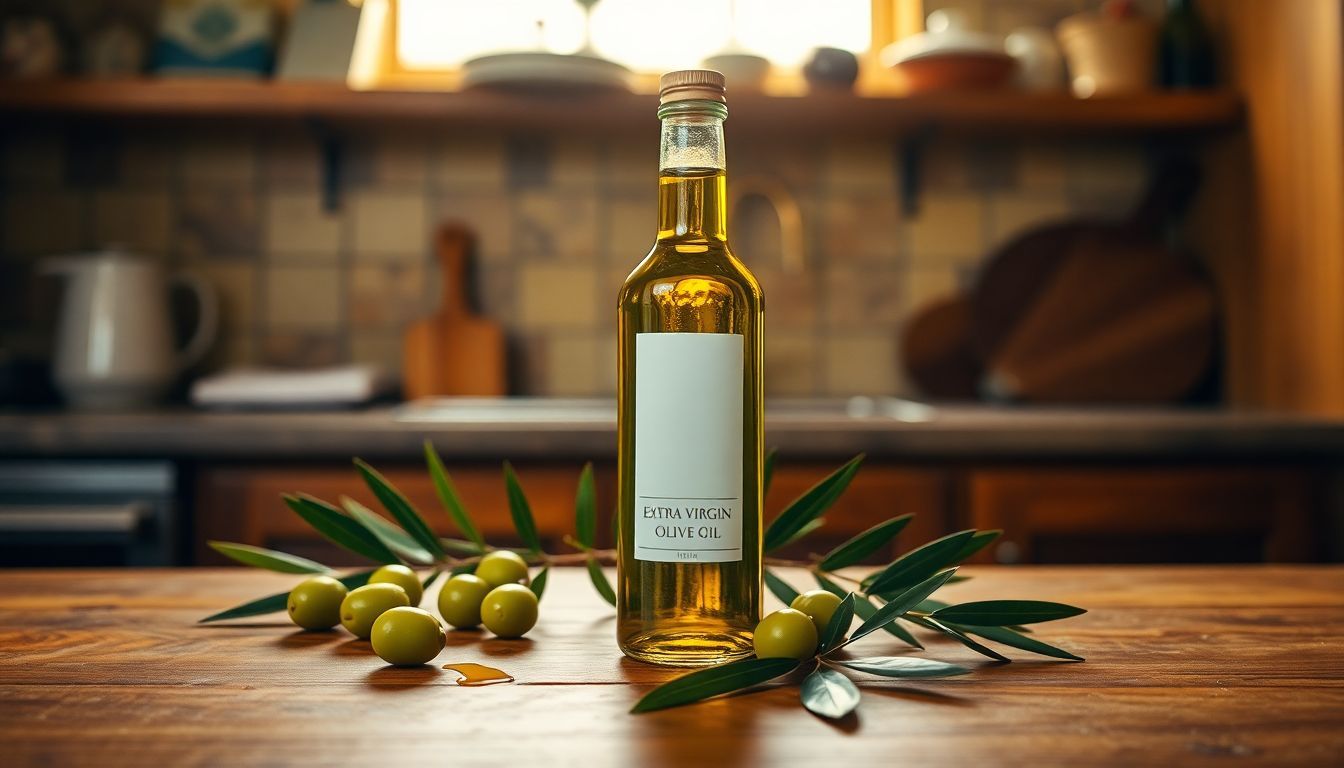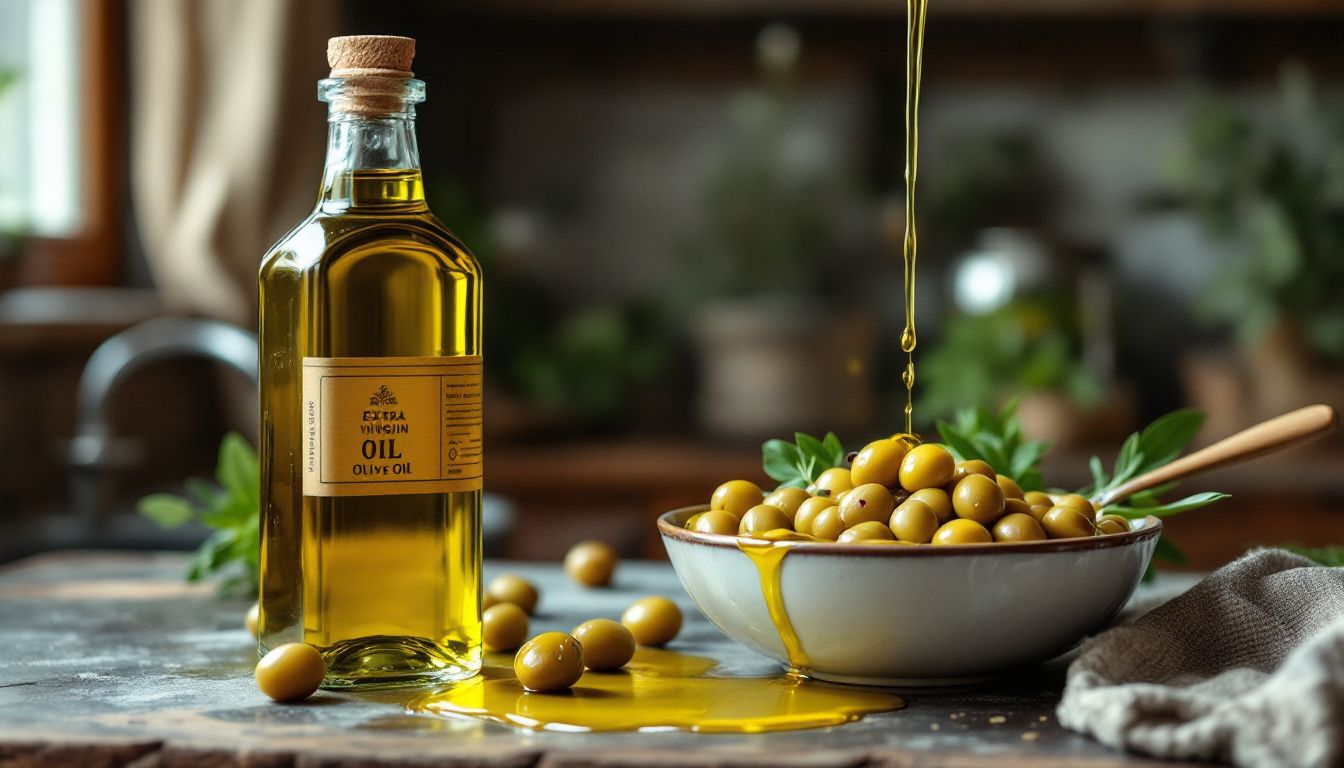Many people wonder if extra virgin olive oil (EVOO) is as healthy as it claims to be. It’s packed with monounsaturated fats and antioxidants, which are great for your body. This blog will explain its health benefits, bust common myths, and share tips on how to use it the right way.
Thank you for reading this post, don't forget to subscribe!Keep reading—you’ll learn a lot!
Key Takeaways
- Extra virgin olive oil (EVOO) is rich in monounsaturated fats, antioxidants, and polyphenols. These support heart health, lower inflammation, and improve cholesterol levels.
- Studies show EVOO can reduce cardiovascular risk by 31% when consumed regularly. Just half a tablespoon daily helps lower bad LDL cholesterol and raise good HDL cholesterol.
- Myths like heating EVOO ruining its benefits are false. Research confirms it stays nutrient-rich up to 400°F and is stable under heat compared to other oils.
- Proper storage in dark bottles and cool areas keeps EVOO fresh for up to two years. Use within six weeks of opening for best quality.
- Adding 2–3 tablespoons of EVOO daily improves brain health. It may slow Alzheimer’s disease progression while boosting cognitive function in the long term.
Health Benefits of Extra Virgin Olive Oil
Extra virgin olive oil is packed with healthy fats like oleic acid, which support overall wellness. Its anti-inflammatory properties can help protect against heart conditions and other chronic diseases.
Rich in antioxidants and polyphenols
Extra virgin olive oil contains powerful antioxidants and polyphenols. These natural compounds protect your body from harmful free radicals. They also fight inflammation and support overall health.
Key phenolic compounds like hydroxytyrosol, tyrosol, and oleuropein boost its anti-inflammatory benefits.
EVOO has up to 120 times more biophenols than canola oil. These antioxidants promote heart health and may help prevent chronic diseases like cancer. Eating it with food instead of in water makes these nutrients easier for your body to absorb.
Olive oil’s high levels of polyphenols make it a true superfood for combating oxidative stress.
Supports heart health and reduces inflammation
EVOO contains powerful phenolic compounds that help fight inflammation. These compounds calm inflammatory reactions in the body, lowering risks linked to chronic diseases like heart disease.
Regular use improves cardiovascular health and reduces hardening of the arteries.
Studies show olive oil supports healthy blood pressure levels and enhances insulin sensitivity. A 2022 meta-analysis revealed people who eat more olive oil have a 31% lower risk of developing cardiovascular issues.
Its mix of monounsaturated fats boosts high-density lipoprotein (HDL) while lowering low-density lipoprotein (LDL).
Helps improve cholesterol levels
Extra virgin olive oil is good for cholesterol. It helps lower bad cholesterol (LDL) and raises good cholesterol (HDL). Studies show it beats other cooking oils like canola oil or sunflower oil at reducing LDL and triglycerides.
Having just half a tablespoon daily can make a difference. Its polyphenols play a key role in improving cholesterol levels while supporting heart health. High cholesterol affects 38% of U.S. adults, making small changes with healthy fats important for better cardiovascular health.

Common Myths About Extra Virgin Olive Oil
Many false ideas surround extra virgin olive oil. Some confuse its properties, use in cooking, and health value—setting the record straight is key!
Heating extra virgin olive oil ruins its benefits
Heating extra virgin olive oil does not destroy its benefits. Research, including a 2018 study, shows it holds up well under heat. It retains more nutrients and stability than canola oil or sunflower oil.
Its smoke point ranges from 375°F to 405°F, making it great for sautéing or stir-frying.
Dr. Selina Wang confirms it’s safe to cook with EVOO up to 400°F without losing its health properties. Even when heated beyond the smoke point, it stays more nutrient-rich than other oils.
Extra virgin olive oils are both stable and healthier options for cooking compared to refined or seed oils like coconut oil.
‘Light’ olive oil is healthier than extra virgin olive oil
Heating doesn’t destroy extra virgin olive oil’s benefits, and switching to “light” olive oil won’t make it healthier either. The term “light” only refers to the flavor or color of the oil, not its calorie count or nutritional value.
Both light olive oil and extra virgin olive oil have about 163 calories in a tablespoon.
Extra virgin olive oil is richer in antioxidants and polyphenols compared to refined oils like light olive oil. Light versions go through more processing, which removes these healthy compounds.
Extra virgin varieties also retain higher levels of monounsaturated fats—key for heart health and reducing inflammation.
The color of olive oil indicates its quality
The color of olive oil varies from pale yellow to deep green. It depends on the type of olives and their ripeness. A dark green oil does not mean higher quality, and a light yellow one is not lower grade.
Competitions even use dark glass cups so judges don’t see the color.
Quality comes down to taste, freshness, and production methods—not color. Factors like antioxidants or healthy fats in extra virgin olive oil stay consistent no matter the shade.
Focus on labels showing “extra virgin” for real health benefits, not just how it looks in the bottle!
How to Maximize the Health Benefits of Extra Virgin Olive Oil
Store your extra virgin olive oil in a cool, dark place and find simple ways to add it to meals—your body will thank you!
Proper storage techniques
Keep extra virgin olive oil in dark glass bottles or tins to block light. Light exposure can degrade its quality over time. Place it in a cool, dark spot, away from heat and direct sunlight.
A pantry is ideal.
Seal the bottle tightly after each use to reduce oxidation. EVOO stays fresh for up to 12 months unopened but should be used within 6 weeks once opened. The best storage temperature ranges between 57°F (14°C) and 70°F (21°C).
Properly stored, it can last up to two years without turning rancid.
Best ways to incorporate into your diet
Extra virgin olive oil (EVOO) is easy to add to meals. It boosts flavor and offers great health benefits.
- Drizzle EVOO on salads as a dressing. Use about 1-2 tablespoons for a fresh, healthy taste.
- Roast veggies or meats with EVOO. Add one tablespoon per cup of ingredients for even cooking and enhanced flavor.
- Replace butter in baking with EVOO at a ratio of 1:0.75. This works well in cakes, muffins, and cookies while cutting saturated fats.
- Use it as a dip for bread instead of butter or margarine. Add some herbs or balsamic vinegar for extra zest.
- Marinate meats and vegetables before cooking using 3 parts EVOO to 1 part acid like lemon juice or vinegar.
- Cook pasta and top it with EVOO instead of heavy sauces to reduce calories but keep the dish flavorful.
- Stir-fry foods with EVOO instead of canola oil or sunflower oil to get more monounsaturated fats and anti-inflammatory properties.
- Swirl some EVOO into soups or stews before serving to bring out a rich aroma and add depth to the dish.
- Sprinkle it over popcorn as a healthier alternative to butter—just use a teaspoon for light coverage.
- Finish cooked dishes like grilled fish, steak, or roasted potatoes with a drizzle of raw EVOO for added nutrients.
Always store your olive oil in cool, dark places to prevent rancid oil from forming due to heat exposure!
The Role of Extra Virgin Olive Oil in Brain Health and Cognitive Function
Extra virgin olive oil helps protect brain health. Its monounsaturated fats, vitamin E, and polyphenols fight damage in brain cells. Daily intake can improve memory and may slow neurodegenerative diseases like Alzheimer’s disease.
Experts suggest two to three tablespoons a day for better cognitive function.
Studies show impressive results. Over 28 years, researchers tracked nearly 92,000 adults with no heart disease or cancer at the start. Replacing one teaspoon of margarine with olive oil reduced the risk of dying from dementia by 814%.
Regular use in a Mediterranean diet boosts your mind while supporting overall health!
Conclusion
Extra virgin olive oil is more than just a cooking staple—it’s packed with goodness. It supports heart health, fights inflammation, and can even protect your brain. Myths about its use don’t hold up to science, so don’t shy away from heating or using it in different dishes.
With proper storage and daily use, its benefits can fit any diet. Stay healthy with this golden oil!
Discover more about how your diet can influence cognitive abilities and which eating styles are best for brain health here.
